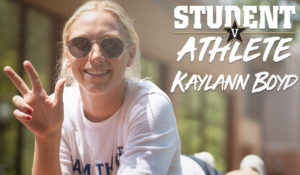Video by Zack Eagles
For this installment of the student-athlete series, we take a look at three graduating seniors.
Fernanda Contreras: Women’s Tennis/Engineering
By Zac Ellis
Fernanda Contreras grew up as a kid knee-deep in a pile of LEGOs in her living room.
Now, as the Vanderbilt tennis senior prepares to graduate with a degree in mechanical engineering, Contreras feels her path has come full-circle.
“Honestly, after these four years, I feel like I can build anything,” Contreras said.
Contreras, an Austin, Texas native, has also built a remarkable college career during her time on West End. She is a three-time All-American, a top-five singles player in the country and will finish as the vaunted tennis program’s all-time leader in career singles wins. Contreras has helped the Commodores win four SEC championships during her career – earning MVP honors at 2018 SECs – and reach the Final Four three times, finishing as NCAA runner-up in 2019.
Off the court, Contreras has thrived as a mechanical engineering major. She has helped design and build robotic circuits as part of a mechatronics class, the kind of experience that helped her decide to attend Vanderbilt in the first place.
“In the recruiting process, I would tell coaches I was interested in engineering,” Contreras said. “Coaches would say, ‘No, you can’t do that. If you want to play tennis, you’ll have to pick something else.’ But when I told Coach [Geoff] Macdonald I wanted to do engineering, he was very excited for me. I knew Vanderbilt was going to work out right then.”
“I wanted to put myself in a position that I would have no regrets at the end of my four years at Vanderbilt. I took my chances and opportunities, and I’m happy.”
Since then, Contreras has made it a point to get the most out of her Vanderbilt experience. She spent time as a member of Vanderbilt’s Student-Athlete Advisory Committee, serving as president as a junior. Contreras has taken part in Vanderbilt Student Government and embarked on service trips abroad, most recently to Morocco last August. She was named “Miss Commodore” for her all-around involvement at Vanderbilt athletics’ annual Golden Dores ball last month.
Macdonald said Contreras has grown immensely during her four years at Vanderbilt.
“She has come a long way,” Macdonald said. “There were a lot of schools who didn’t recruit Fernanda because they thought she was a little too slight and could get overpowered. But she’s proven to be a brilliant tactician and had a great career. She’s quite a remarkable young woman … You look at what these young people do, it’s amazing. I’m lucky to be here, because you get to offer SEC tennis and a world-class education.”
Contreras realized early on the importance of the full student-athlete experience. At Vanderbilt, she told herself, I can have it all. Now, as she prepares for her next chapter as a professional tennis prospect with an elite engineering degree, Contreras said she is thankful for her all-encompassing time at Vanderbilt.
“I think if you don’t do that, you’re letting yourself down,” Contreras said. “I just explored everything that Vanderbilt had to offer. I took classes I never expected, like theater and other random classes. I joined VSG for a year. Vanderbilt just has so much to offer, it’s insane. I wanted to put myself in a position that I would have no regrets at the end of my four years at Vanderbilt. I took my chances and opportunities, and I’m happy.”
Kristin Quah: Women’s Bowling/Engineering
By Rod Williamson
Vanderbilt graduate and highly decorated Commodore bowler Kristin Quah, who regularly displayed her talents on the lanes, recently represented Vanderbilt among another group of elite talent.
She traveled to Montreal May 15 to present an academic abstract on focused ultrasound (non-invasive surgery) at the International Society for Magnetic Resonance in Medicine’s 27th Annual Meeting and Exhibition – the world’s largest and most influential meeting of MRI professionals.
While the vast majority of collegiate athletes have had their hands full working toward graduation and giving their all for their sport of choice, Quah worked overtime as a dominating force on Vanderbilt’s nationally prominent bowling team, and performed research at Vanderbilt’s renowned medical center.
“Non-invasive surgery – focused ultrasound – is up and coming,” Quah said, “It is the ability to apply heat to a very focused part of one’s body without having to make a surgical incision. Surgeons need some kind of visualization and the MRI comes into play because you can get temperature maps from MRIs but the current methods don’t give enough volume coverage. You can only see a single slice so you need to increase the volume and that’s what I’ve been working on.”
This isn’t a topic that comes up between frames on the bowling lanes.
“She’s the best undergraduate student I’ve ever worked with,” William A. (Will) Grissom, Quah’s academic mentor and an associate professor of biomedical engineering,”said bluntly. “She has the unusual ability to work on open-ended problems and come up with her own solution to technical problems. Most students need solutions spelled out for them, a lot more guidance. Her research is the same thing – she will try things, trusting her own ideas.”
“When I first got to school I thought I was going to bowl when I got out; that’s what I wanted to do. But the more I got into school, the more I liked it. Last year, when I started research, I loved it and it’s changed my perspective on how I think of myself, my identity.
Quah will head to Stanford University to perform PhD research on full scholarship next year, perhaps being able to focus solely on academics for the first time after a prolific student-athlete career.
“I definitely think I had two lives on this campus,” Quah said. “I joked about it sometimes. A professor would ask me if I could do something and I’d say, ‘Hold on, I need to check into the other half of my life.’
“When I first got to school I thought I was going to bowl when I got out; that’s what I wanted to do. But the more I got into school, the more I liked it. Last year, when I started research, I loved it and it’s changed my perspective on how I think of myself, my identity. Now I think they are both fun.”
The three-time All-American says each discipline made her better. Academics taught Quah how to logically think through a process, a way to think outside the box. She now understands there is probably a solution out there, and if one way doesn’t work, try another.
Athletics taught Quah life skills such as time management, goal setting and, especially, communication.
“When I was younger I really couldn’t communicate,” Quah said. “I didn’t talk a lot. Through bowling and having to work with coaches and teammates it’s made me better. By no means am I great at it — in fact, I will say communication is one of my weaknesses. But my skills have definitely improved.”
It is tempting to assume all the success comes easily to Kristin, and that’s not entirely true. The Singapore native follows the old-school philosophy of early to bed, early to rise and manages to stay well organized.
“I usually am up by 6:30 a.m. and get some breakfast,” she said, “and then I do some work until my first class or meeting, which typically is about 8 or 9. I go to bed early, usually asleep by 10. I don’t compromise my sleep.”
She tries to keep some room on her agenda for relaxation.
“One of the reasons I like getting up early is so I can have my work done by 8:30 p.m. and have an hour or so at night to do things that relax me. Maybe that’s watching some TV or working on jigsaw puzzles. We have four or five of us that really like puzzles, especially in the fall when we were around more.”
Life was almost going too well for Kristin as last fall’s bowling schedule came to a close for the holidays. The Commodores were winning, she had made three all-tournament teams and was leading the Southland Bowling League in 17 of the possible 24 individual categories. That would have put her into the national player of the year conversation and a first-team All-America selection at the very least.
But Quah’s wrist began acting up, and her fingers would go numb if she threw too many practice balls. She made several visits to one of the nation’s leading hand-injury physicians at Vanderbilt Medical Center. The diagnosis was a rare condition that boiled down to this: she could continue bowling because she could not worsen her condition, but it also would not fade quickly into the Nashville night.
Quah worked to cut her practice time in half, although that caused her to lose her timing. Every once in a while, rolling a bowling ball would send a shock through her entire arm, which created a subconscious fear of when the next jolt would occur. She went from a mainstay in the Vanderbilt bowling lineup to a less frequent substitute.
“The most frustrating thing was the timing of the matter,” Quah said. “If this were earlier in my career or a different time of year, I could recover and come back.” But this was my last couple of months before I graduated … If I rested, I was done.”
Quah has received many honors during her Vanderbilt career. She won the Undergraduate Design Award for an early version of her research at the 2018 Biomedical Engineering Society meeting in Atlanta (“I’ve never had a student win this award,” Professor Grissom said). She is also a member of elite academic honor societies Tau Beta Pi and IEEE-Eta Kappa Nu. She also was a Vanderbilt Undergraduate Littlejohn Summer Research Scholar.
In April, Quah became just the third student-athlete in Vanderbilt history to garner the Boyd. H. McWhorter Award, which is presented annually to the outstanding female student-athlete in the Southeastern Conference. She also repeated as the NCAA Elite 90 Award winner at the NCAA Bowling Championship, which is given to the student-athlete at each championship who boasts the highest grade-point average. A double-major in biomedical and electrical engineering, Quah earned a 3.97 GPA.
On the lanes, Quah was named to nine all-tournament teams in her career, including four as tournament MVP. She was voted the program’s Harry Stoddard Award recipient for her leadership and team contributions, was the 2016 national Rookie of the Year and named All-America three times. Quah helped Vanderbilt win the 2019 NCAA Bowling Championship and finish as NCAA runner-up earlier this spring.
“I think I most appreciate winning the NCAA Elite 90 Award,” Quah said. “The way the team reacted when they announced my name, that it was an award I’d always heard was next to impossible for a Vanderbilt student to win …That was special. And, of course, last year’s national championship. I’ll never forget that.”
Quah’s days as a Vanderbilt student-athlete have come to an end, but her legacy as an extraordinary woman of accomplishment on West End will long be remembered.
Evan Suzman: Men’s Cross Country/Peabody
By Zac Ellis
Evan Suzman smiles when asked to reflect on his growth as a student-athlete at Vanderbilt. “I’m definitely a lot faster,” Suzman laughs. “I can thank my coaches for that.”
Suzman, a cross country runner for the Commodores and a member of the Class of 2019, likes to clear his mind with long, winding runs across campus. Off the course, the native New Yorker is a double major in history and child development, with a focus on the history of science.
For Suzman, Vanderbilt’s athletics and academics have offered the perfect combination for his college career.
“I really like having something to do, but I also like competing,” he says. “Our team is a really great group of like-minded guys who like to compete and like to win. But we’re all serious about our academics, which is why Vanderbilt is unique. I have friends at other schools who play their sport, and that’s it. Our team here is very passionate about running, but we’re passionate about things outside of school, too.”
“Our team is a really great group of like-minded guys who like to compete and like to win. But we’re all serious about our academics, which is why Vanderbilt is unique.”
In addition to his time on the cross country team, Suzman has spent the past two years as a research assistant in the lab of Assistant Professor of Hearing and Speech Sciences Tiffany Woynaroski at the Vanderbilt Kennedy Center for Research on Human Development. Suzman has teamed with Woynaroski’s lab to study biobehavioral approaches in neurodevelopmental disorders, specifically focusing on sensory and multisensory processing in individuals with autism.
“Our research tries to understand how early sensory differences are linked with later communication and language outcomes,” he explains.
As part of his history major, Suzman has studied the intersection of history and technology. His work through an independent study with Ole Molvig, assistant professor of history, involved the language of modernity today and its parallels to the Industrial Revolution.
While Suzman has enjoyed his academic work, competing as a Commodore student-athlete added another element to his time in college. He will graduate as a four-time member of the Southeastern Conference Academic Honor Roll, and last fall he clocked a personal-best time of 24:44.1 in the 8K race at the SEC Cross Country Championships in Auburn, Alabama.
“I love running,” Suzman says. “If nothing else, it’s an excuse to spend an hour or two outside every day. You feel uniquely connected to nature that way. A lot of people view cross country very individualistically, but I’ve come to appreciate the team nature of the sport more since being at Vanderbilt.”
While graduation will mark the end to Suzman’s athletic career, his time at Vanderbilt remains unfinished. Next fall he begins a master’s program in biomedical sciences, an opportunity to continue his lab work and take another step toward medical school or a Ph.D. program.
“At Vanderbilt, I’ve grown a lot more comfortable in my own skin and grown more interested in subjects I am passionate about,” Suzman says. “Plus, cross country has provided me with a deep sense of camaraderie. It’s a unique kind of friendship that takes place on a team.”


